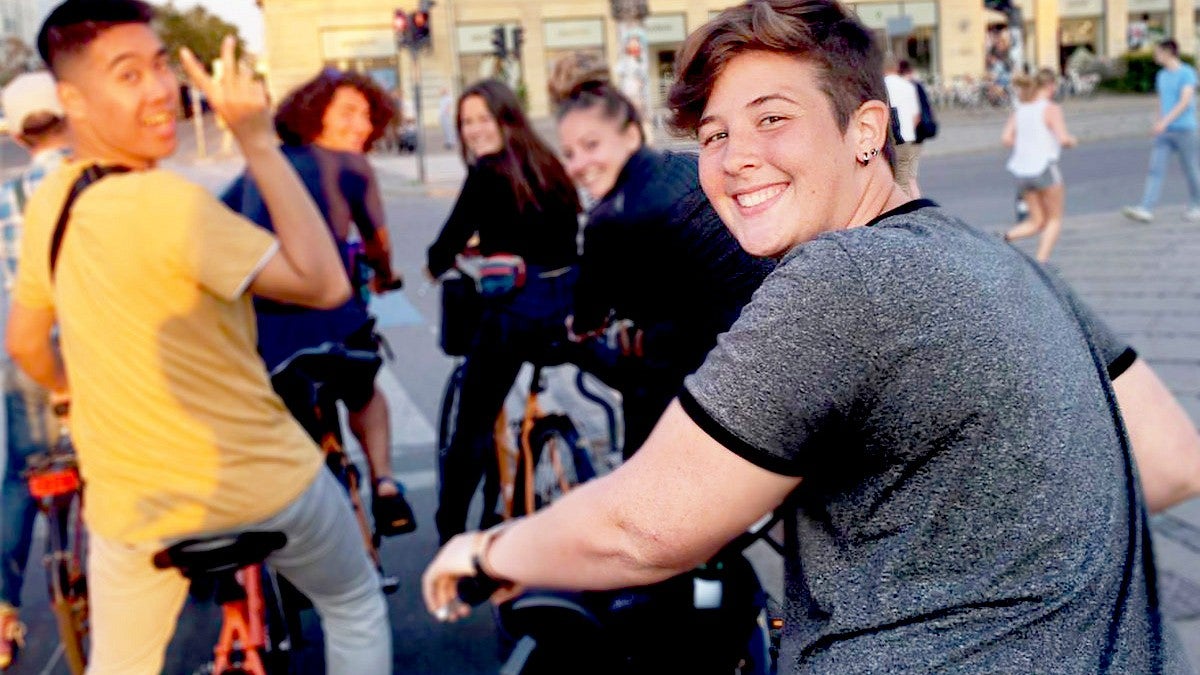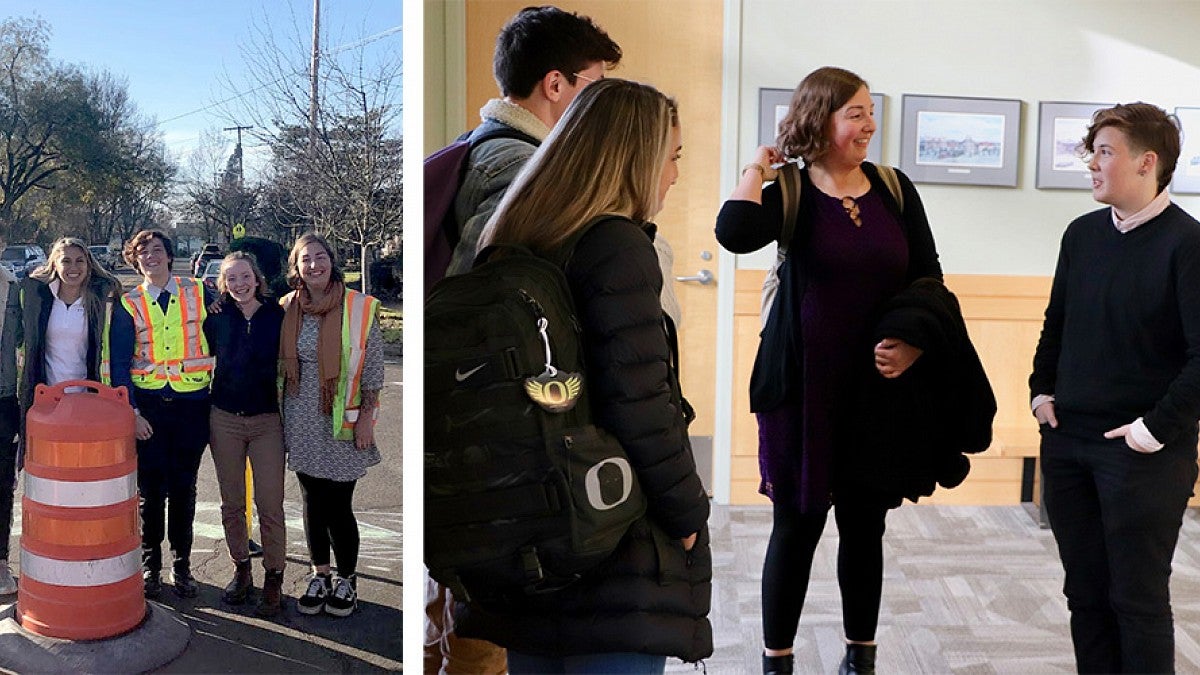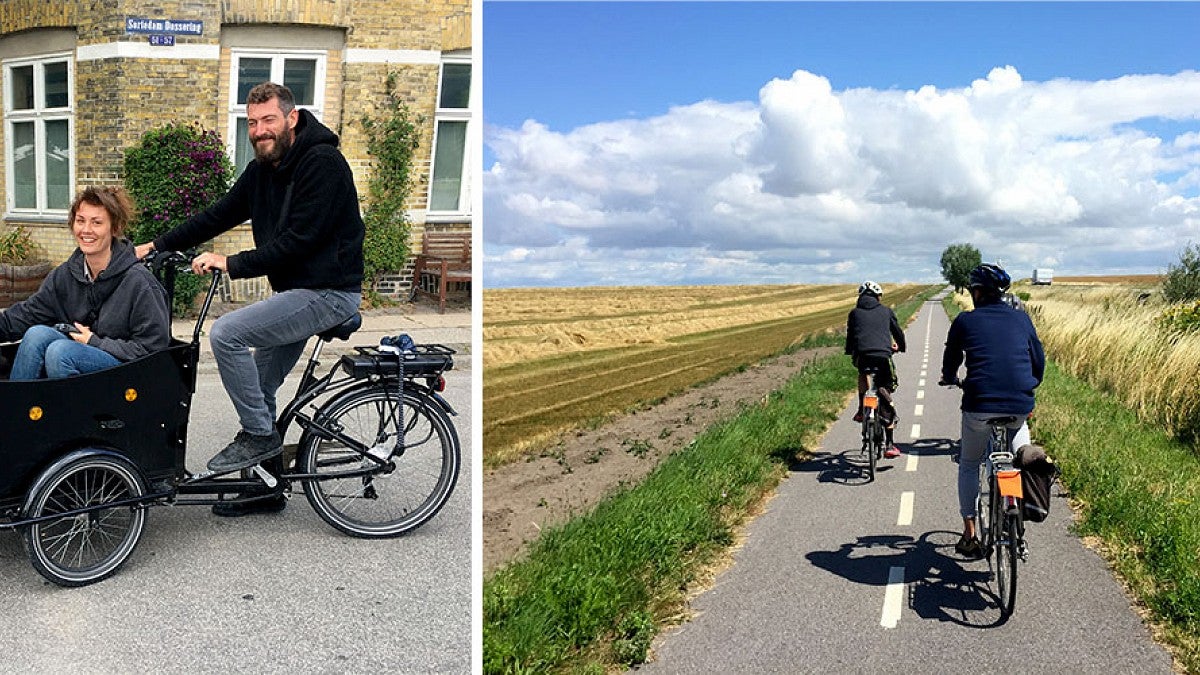
Finley Heeb, right, on the Sustainable Bicycle Transportation in Europe study abroad program
Sitting in a coffee shop on campus, Finley Heeb recalls the thrill of traveling with fellow students across Western Europe to cities such as Copenhagen and Amsterdam—all without a car.
“We could ride our bikes from Denmark to Sweden. We could take a train from one city to another. There was absolutely no need over the course of this trip for a car. It was so incredible to not have the burden,” Heeb said.
Heeb was one of a group of students who attended the summer 2019 Sustainable Bicycle Transportation in Europe study abroad program with the School of Planning, Public Policy and Management (PPPM) faculty Marc Schlossberg and Rebecca Lewis.
More on Finley
Outside of classwork, Finley is a
speaker series coordinator for
LiveMove, a UO transportation
and livability student group that
brings together undergraduate and
graduate students from a variety of
backgrounds and disciplines to focus
on the planning and design of
transportation systems as they relate
to community quality of life and
livability.
Finley helps organize events such as
the LTD Transit Tomorrow
presentation Feb. 26, Fighting for
Climate Justice with Aaron Brown
March 2, and a screening of the film
Motherload and a Q&A with
director Liz Canning March 8.
As a PPPM undergraduate, Heeb fell in love with planning and the role of alternative transportation early in their university career.
“So much of planning is based on community,” they said. “There is something really beautiful about not only trying to better your environment for yourself, but also for the people that share the environment with you.”
In high school, they explained, they struggled to find their niche—not excelling at math, science, or writing. Heeb liked working with animals and volunteered at the Oregon Zoo in Portland and the El Refugio Foundation in Colombia. Their experiences exposed them to the world of nonprofits, which in turn led Heeb to the PPPM program.
“It was very tangible. I felt like it made sense. I went through high school and really struggled. I felt like there was nothing I was that good at,” Heeb recalled. “City planning felt like something that wasn’t based off of which of these skills you are good at—it was based so much on passion, what feels right, and what you want to see changed in the world. Everything came second to that.”
Heeb explained that while hard skills like writing and statistics are key to the field, they aren’t the starting point for a successful planning or transportation project.
Fall term, Heeb was able to combine passion with hard skills in Real World Eugene, a course taught by PPPM Teaching Faculty Bethany Steiner.

Heeb's tactical urbanism group for Real World Eugene
In their group, Heeb and students worked with the City of Eugene for a project focused on a busy intersection with low visibility in the residential Whiteaker neighborhood. The goal was to figure out how to slow traffic, increase safety, and improve the pedestrian experience using “pop-up,” or tactical, urbanism—a community-based approach that uses a short-term and fast-paced response to inform a long-term change.
The student group worked on neighborhood engagement; designing surveys and informational fliers to find out what people who both used and lived by the intersection would like to see; and reaching out to city councils and committees.
They also hosted a community event to test a solution, setting out traffic cones and chalking out a roundabout design on the pavement. The students collected data and feedback, and prepared a final report, presenting their findings to the Lane Council of Governments.
“It’s been empowering to work in an environment where change is possible and city leaders are dedicated to making this change,” Heeb said. “This intersection is for everyone that travels through it, but it’s also for everyone who lives by it. They should have a say in how they would like to use it. By creating a more neighborhood-friendly design we can give them a space to make their own.”
Video of Heeb's tactical urbanism project with the City of Eugene
The project was also about returning some of the space occupied by cars in our cities to the people who occupy those neighborhoods. One way Heeb would like to do that moving forward is to create more biking infrastructure, like they saw in Europe.
A year ago, Heeb decided they would never make another trip by car unless it was their only option. Biking is Heeb’s main mode of transport.
“The more I learn about transportation the more I’m not okay with driving,” Heeb said. As they point out (and the Environmental Protection Agency confirms), transportation is the largest contributor of greenhouse gas emissions in the U.S. “I’ve been thinking a lot about how biking and walking are so efficient and environmentally conscious, but also how transit shapes that. How do we make transit systems that serve everyone and how do we make them accessible?”
Looking to the future, that is how Heeb would like to affect change—by helping redesign transportation networks to shift the priority away from cars.
“I want to work in active transportation and help cities improve bike infrastructure,” they said.
Heeb again recalls the bike culture of Europe, allowing people to safely commute to work, intimately connect to their neighborhoods, and cycle across both countrysides and borders.
“Biking is so much more social and it connects you to the people around you rather than putting everyone in these metal boxes. Being in cars is incredibly frustrating. Everyone is honking. There is no compassion in it. You’re in a car and instantly everyone else on the road is inconveniencing you,” they said. “When you’re on a bike, it’s this beautiful dance you’re in with everybody else in your community.”

Scenes from the Sustainable Bike Transportation in Europe study abroad trip in summer 2019
